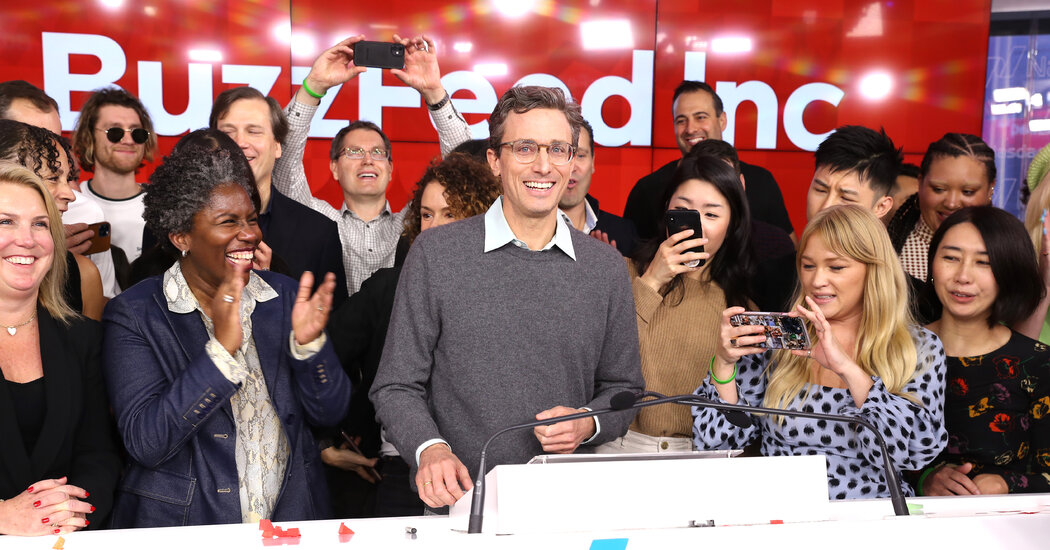
The head of BuzzFeed News and two other top editors are departing the company ahead of cuts to the newsroom.
Mark Schoofs, who became the editor in chief in 2020, said in an email to staff members on Tuesday that he would be stepping down. He said that Tom Namako, the deputy editor in chief, and Ariel Kaminer, the executive editor of investigations, would also leave the company. Mr. Namako said in a tweet that he was joining NBC Digital as executive editor.
Mr. Schoofs said in the email that BuzzFeed had subsidized the news division for many years and the “next phase” for BuzzFeed News was to reach profitability in its own right.
“That will require BuzzFeed News to once again shrink in size,” he said, adding that the company hoped to achieve this through voluntary buyouts rather than layoffs. He said the buyouts would be available to those on the investigations, science, politics and inequality desks.
Samantha Henig, BuzzFeed News’s executive editor of strategy, will act as the interim editor in chief while a search for his successor is underway, Mr. Schoofs added.
Jonah Peretti, BuzzFeed’s chief executive, said in a separate email to the staff on Tuesday that BuzzFeed News would need to “prioritize the areas of coverage our audience connects with the most.” He also announced further job cuts across the company, including on the BuzzFeed video team and the editorial team at Complex Networks, a lifestyle publisher that BuzzFeed acquired last year, as well as the business and administrative teams.
“The cuts impact around 1.7 percent of our total workforce today,” Mr. Peretti wrote, “and we do not take that lightly.”
The resignations and cuts at BuzzFeed’s newsroom is a major setback for BuzzFeed News, one of the scrappiest and most successful digital news operations in the country. The newsroom, started in 2011, made a name for itself with innovative storytelling and investigative reporting, winning a Pulitzer Prize in 2021 for a series that revealed the scale of China’s internment of Uyghurs.
But it has struggled financially and contracted at various times. In 2019, BuzzFeed cut 15 percent of its entire work force. In 2020, BuzzFeed News ended its operations in Australia and the United Kingdom. Late last year, the news division’s parent company, BuzzFeed, started trading on the stock market, adding pressure for better financial results.
Tuesday’s staff departures came as BuzzFeed reported its financial results for the first time as a public company the same day. BuzzFeed reported revenue in the most recent quarter of about $145 million, up 18 percent from the same period a year earlier. Its profit in the most recent quarter rose to $41.6 million, up 29 percent from the same period the previous year, though this was bolstered by tax provisions and other accounting items.
The company said that it expected revenue to fall by “a low single-digit percentage” in the current quarter and record an adjusted loss of between $15 million and $20 million.
BuzzFeed stock was mostly flat on Tuesday, trading at around $5.
BuzzFeed went public in December by merging with a special purpose acquisition company, or SPAC, in a deal that valued the company at $1.5 billion. The company is now worth about $660 million. Before the merger, investors in the SPAC withdrew about 94 percent of the money raised, leaving BuzzFeed with only $16 million.
Last week, nearly 80 former and current BuzzFeed employees filed mass arbitration actions against the company, accusing it of illegally preventing them from trading their shares because of administrative errors. The claims are asking for compensatory damages estimated at over $8.7 million. BuzzFeed said there was no merit to the claims.
On an earnings call on Tuesday, Mr. Peretti said that short-form vertical video, like those on TikTok, was emerging as the “preferred content format” for young people and the company would accelerate its investment in such videos.
He said the changes at BuzzFeed News would accelerate its profitability.
“We will prioritize investments around coverage of the biggest news of the day, culture and entertainment, celebrity and life on the internet,” Mr. Peretti said.




